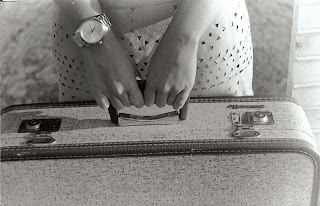The original UVU production of Sarah Ruhl’s Eurydice was staged in the Noorda Theatre – a black box where the audience was so close, you almost felt you were in the story. The remount of Eurydice at KCACTF has moved the show into a traditional proscenium stage space; fixed seats on a raked plane, a curtained stage viewed through a picture-box frame.
How does changing spaces change the show? Does the set change? Do the actors have to act differently? They answer is definitely yes! Except for the text, it changes almost everything! Adjustments need to be made to the set; actor’s need to reach an audience that is suddenly much farther away; it even changes the mood and feel of the production.
Kyle Oram, the actor playing Orpheus, said, “Rehearsing for a larger space has been a really new experience. It's nice to be able to make bigger choices.”
The director, Lisa Hagen, said, “"Initially it was a scary thought, because we had created an intimate and sober tone in a small space. Not to mention they'd never had to project those lines at such a volume! Moving the show meant changing the audience's spatial and emotional relationship to the world they were seeing. The proscenium implies a distance we had never anticipated. To adjust, we have re-imagined the tone into something more vibrant and playful, and the results have actually helped to create new moments of intimacy and 'smallness' within the much larger space."
So it’s a challenge, but it’s also an opportunity – one that Eurydice’s cast and crew have grabbed onto! Don’t miss the remount this weekend at Mountain View High School, Thursday and Saturday at 7:30. It’s a whole new show!









